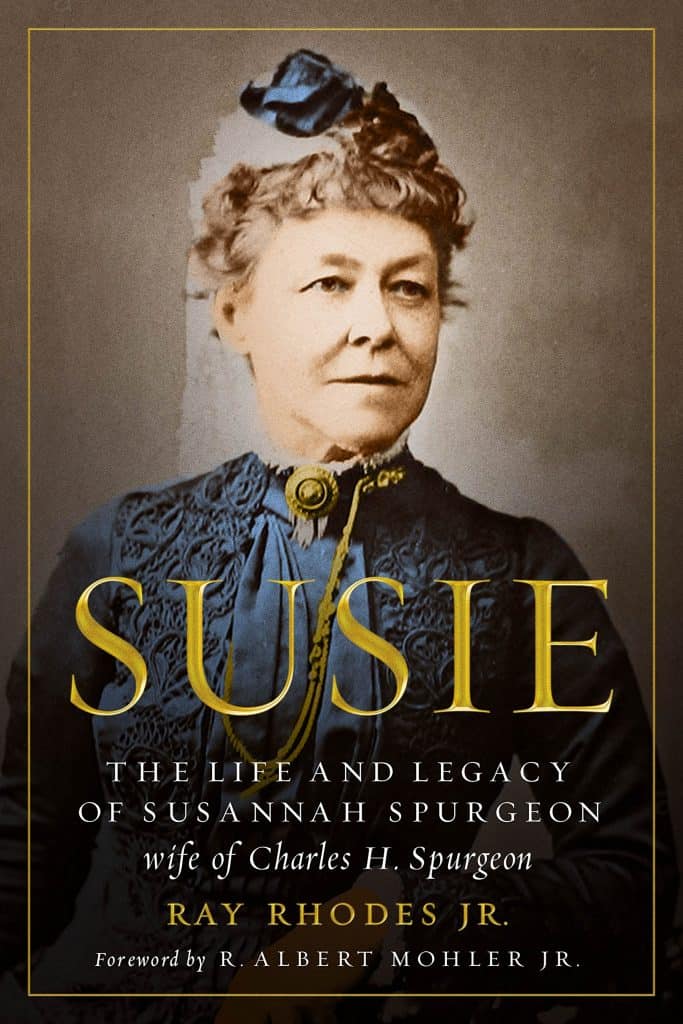⏱️ Estimated Reading Time: 4 min read
To read Ray Rhodes’ recent biography, Susie: The Life and Legacy of Susannah Spurgeon, is to witness a life of utter surrender to service. As much as Susie was able, she offered herself fully and wholeheartedly to supporting her famous husband’s ministry. She made an early vow to “never hinder him in his work for the Lord, never try to keep him from fulfilling his engagements, never plead my own ill-health as a reason why he should remain at home with me” (62). Rhodes mines every possible source to provide a well-rounded view of Susie’s faith and times. Seeing how much she dedicated her life to her husband’s career, one has to wonder just what his ministry would have been without her.
Her ill-health would remain an issue most of her life, but as far as her biographer can tell, she kept her vow to the uttermost. They endured long separations to allow him to teach and then to travel to France where he went frequently to recover his health. She read commentaries aloud to him to help him prepare, prayed for him earnestly, and encouraged him constantly. During the years when she was more or less housebound, her relentless efforts to get his sermons and books into the hands of poor pastors through her Book Fund ensured that his excellent preaching would be even more widely influential. She was a woman of talent and force, and she offered all of it to her husband, and ultimately, to her Lord.
Rhodes weaves in glimpses of their love story throughout the book. In many ways, this book shows how a generous husband and wife can enrich one another. He maintains a steady focus on Susie even when including pertinent details about Charles’ career, and often celebrates their shared sensibilities. For example, he summarizes a great deal of their writing by pointing out how “Charles and Susie perceived messages in flowers, gentle flowing water, the cool breeze on a fall morning, and in the parting of trees that allow glimpses of the blue sky above. Nature provided sermons and stories, readily employable as descriptors of Christ, the gospel, and the Christian life” (194-195).
Reading this biography as a modern pastor’s wife was intimidating. Her devotion is admirable but sounds unattainable. (I was grateful when Rhodes pointed out that she likely had up to a dozen staff working at their home, freeing her to do her work on the Book Fund.) Mostly, I found myself fascinated by her Victorian sensibility and how it contrasted with our era. I winced at her idealized description of a grateful, poverty-stricken pastor receiving her books: “He has broken down completely now, the tears are running down his cheeks, but they are rills from the fountain of joy, not of sorrow, and will refresh and heal his spirit. The Lord Himself has spoken to him, an angel has strengthened him…” (142). No doubt, her heart was dedicated to ensuring the gospel went forth but she did seem rather out of touch with the day-to-day demands of ordinary ministry life. Her life seems to provide an ideal of the Victorian era pastor’s wife, but I fear seeing her dedication as the standard would exhaust my modern-day peers.
Rhodes honors her finest attributes but provides the proper context for her life story that helps modern readers to better understand the Victorian era in which she lived. Susie is a thorough, engaging, and readable biography and I, for one, hope to see more biographies like this one that let us into the marriages between renowned pastors’ and their wives.




